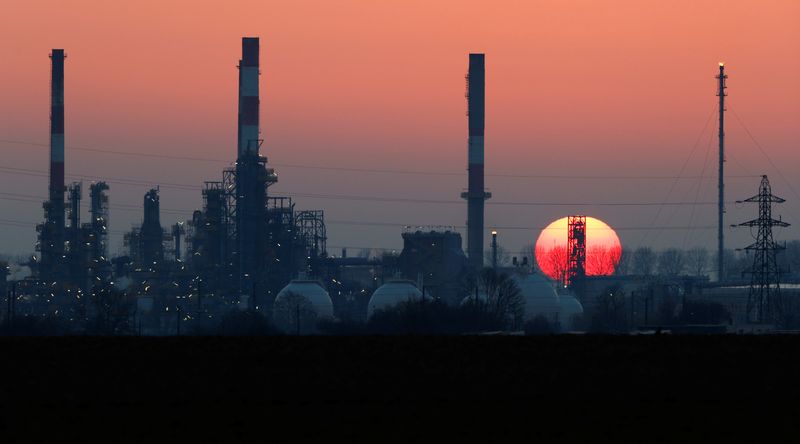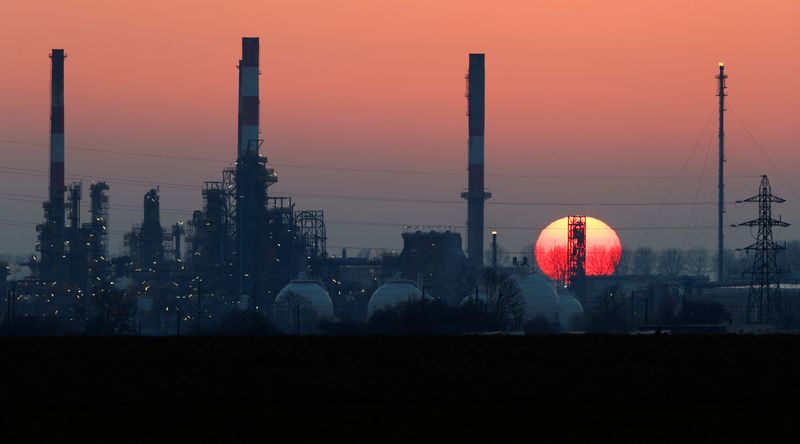Commodities
Oil dips on faltering Chinese economy


© Reuters. The sun sets behind the chimneys of the Total Grandpuits oil refinery, southeast of Paris, France, March 1, 2021. REUTERS/Christian Hartmann
By Natalie Grover
LONDON (Reuters) -Oil prices fell on Wednesday, pressured by lacklustre economic activity in leading crude importer China, but a first monthly gain since September remained in sight as flaring tensions in the Middle East heightened supply concerns.
futures for March, which expire today, fell 87 cents, or about 1.1%, to $82 a barrel by 1103 GMT. The more actively traded April contract fell 80 cents, or about 1%, to $81.70.
U.S. West Texas Intermediate crude futures lost 82 cents, or roughly 1.1%, to $77 a barrel.
Manufacturing activity in China, the world’s second-largest economy, contracted a fourth straight month in January, an official factory survey showed on Wednesday.
The latest sign of the country’s broader economy struggling to regain momentum came days after a court ordered the liquidation of troubled property developer China Evergrande (HK:). The real estate sector accounts for a quarter of China’s GDP.
Major forecasters, including the Organization of the Petroleum Exporting Countries (OPEC), see oil demand growth in 2024 driven primarily by Chinese consumption.
“The factory data confirms our view that China, at least for now, is an impediment to global oil demand growth,” said Tamas Varga of oil broker PVM.
The Israel-Hamas war, meanwhile, has expanded to a naval conflict in the Red Sea between the United States and Iran-aligned Houthi militants.
While that has disrupted oil and tanker shipping, which is driving up delivery costs and starting to affect oil supplies, a Reuters poll suggested that record production in the West and slow economic growth will keep a lid on prices and limit any geopolitical risk premium.
“The main issue with turning outright bullish on here is the technical picture remains bearish and is yet to catch up with recent events,” including a deadly drone attack on U.S. troops near the Jordan-Syria border last week, said IG market analyst Tony Sycamore.
Yemen’s Iran-aligned Houthi group on Wednesday said it would keep up attacks on U.S. and British warships in the Red Sea in what it called acts of self defence, stoking fears of long-term disruption to global trade.
Meanwhile, Israel’s offensive in Gaza persisted, though Palestinian militant group Hamas said it was studying a new proposal for a ceasefire and release of hostages in Gaza.
Commodities
Oil prices rise; U.S. crude inventories plunge, Russia-Ukraine truce eyed
Commodities
India’s Reliance to stop buying Venezuelan oil over US tariffs, sources say
Commodities
Oil prices climb on Venezuela supply worries

 Forex3 years ago
Forex3 years agoForex Today: the dollar is gaining strength amid gloomy sentiment at the start of the Fed’s week

 Forex3 years ago
Forex3 years agoUnbiased review of Pocket Option broker

 Forex3 years ago
Forex3 years agoDollar to pound sterling exchange rate today: Pound plummeted to its lowest since 1985

 Forex3 years ago
Forex3 years agoHow is the Australian dollar doing today?

 Cryptocurrency3 years ago
Cryptocurrency3 years agoWhat happened in the crypto market – current events today

 World3 years ago
World3 years agoWhy are modern video games an art form?

 Commodities3 years ago
Commodities3 years agoCopper continues to fall in price on expectations of lower demand in China

 Economy3 years ago
Economy3 years agoCrude oil tankers double in price due to EU anti-Russian sanctions

























